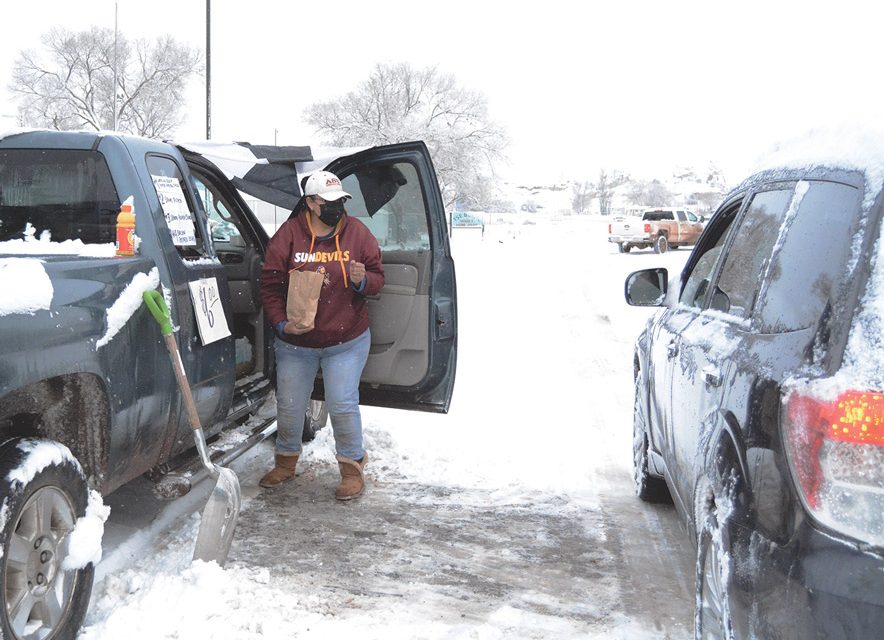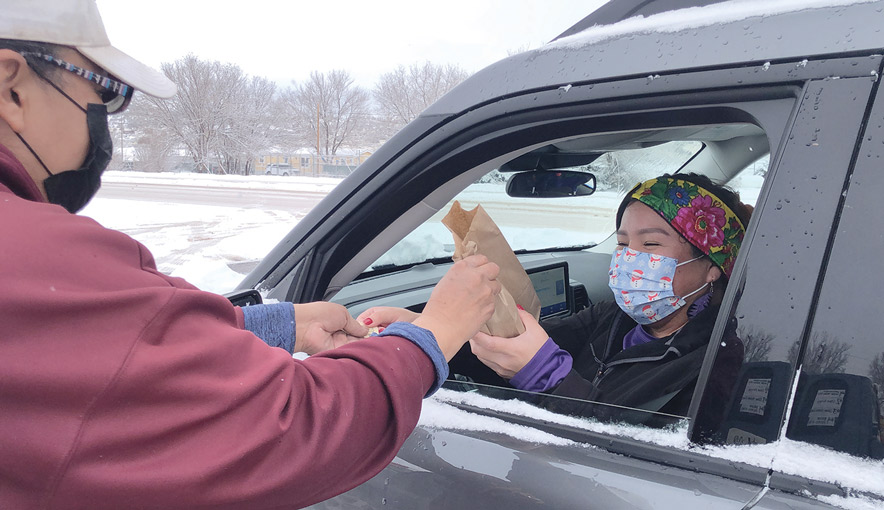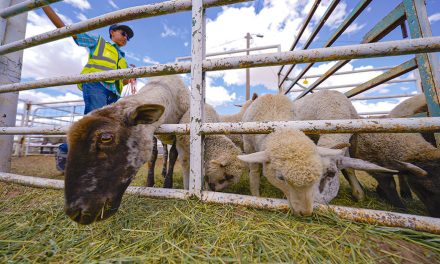
Pudgies: Beloved burrito lady’s ‘giving heart is bigger’

Navajo Times | Holly James
Hermanda Jesus takes a breakfast burrito order while it is snowing during a morning rush hour in Tse Bonito, N.M.
WINDOW ROCK
If the morning commute takes one near Tse Bonito, New Mexico, and the Arizona border, one can’t miss the long line of vehicles full of loyal customers that return every morning for one particular and loved burrito lady.
That line is for Hermanda Jesus.
Burrito ladies in the Navajo Nation have earned status and follow all their own. One will see them in the early morning hours in all parts of Dinétah setting up their tables, signs, menus, and ice chests full of their homemade delicacies that many return for day after day as part of their morning schedule.
Some burrito ladies may feel their customers know because buyers go to them every day on the way to work, town, or whatever errand motorists be running that day. It is a sense of familiarity. Maybe they remind people of their mother, an auntie, or a sister.
Jesus, 47, originally from Prewitt, New Mexico, moved to St. Michaels, Arizona, after she married her husband, who is from the area, and together, they raise their six children.
She is Haltsooí Dine’é and born for Kinyaa’áanii. Her maternal grandmother is Kinyaa’áanii, and her paternal grandfather is Tódích’íi’nii.
One can’t miss Jesus. She is always next to her green truck, wearing her Arizona State University baseball cap and maroon ASU sweatshirt to honor her sons attending college there. It is her reminder of why she does this every day.
Looking for a job
Newly married and looking forward to starting a life with her husband and blended family, they settled into their new life, and she started looking for a job.
Raising a large family comes with a lot of commitment and time management. She was hoping to find employment that would be a little flexible with time so she could be available as much as possible to help her children with homework and attend their school functions and activities. However, that quickly became wearing and a challenge.
On a random evening, she asked her husband what he thought about her idea of selling burritos until something else fell into place.
She thought it would give her the flexibility of working in the mornings, freeing up the time she needed to help the kids with homework, their goals, and being a partner in raising a family.
She recalls the conversation with her husband in short. All he asked was if she was sure she wanted to try it. Without hesitation, she answered him with a confident yes, and she said he was all for it and supportive, and she began her preparation.
Getting started
Unsure of what the customer traffic would be with her as a newcomer, also conscious of food and money waste, she began with only small batches of her breakfast burritos and her biscuit sandwiches called “Pudgies,” named after a nickname her husband gave her.
Armed with a small ice chest of her Pudgies and burritos, she set up her selling spot near some veteran vendors.
The first day, she sold out the small amount she brought, thinking she was the new kid on the block or perhaps it was just beginner’s luck.
However, she kept selling out for the next few days, which changed her mind about it being luck.
Chatter on the Rez tends to travel fast, especially regarding the foods people appreciate and love.
As she noticed her line grew, many customers told her that they heard about her food from the locals and others passing through and that they had driven many miles from communities such as Leupp, Ganado, Tohatchi, Sheep Springs, Gallup, and Farmington to try her food.
“I was in shock; I couldn’t believe that people were coming as far as they did to come try my food,” Jesus said.
The demand for her burritos started increasing quickly, and Jesus had to devise a plan to keep pace.
Jesus paid much attention to daily commuting traffic, tribal government schedules, special events, conferences, and construction workers, which would send hungry traffic her way.
Conscious of waste, costs, and keeping up with demands, Jesus devised a system that took about two years to perfect.
After much trial and error, she kept a journal of her batch amounts and the measurements needed for each not to make more than she needed.
This method has come in handy over the years as word of mouth began circulating about her burritos, with local schools, offices, and other organizations placing orders in bulk for their functions or celebrations.
Day in life of burrito-making
As the years have passed, the business has been steady and still increasing. The lines in the morning next to her green truck are evidence that after almost 20 years, her food still holds its legacy and leaves her customers with full bellies and a little extra cash in their wallets, as her foods are also budget-friendly.
What does a day in the life of a burrito lady look like?
In this day and age, where people are conditioned for immediate gratification, it is super convenient to drive through the line, get breakfast, and go on with the workday.
So what goes into a day of a burrito lady?
People know what it takes to make their meals at home but on a much smaller scale. However, can one imagine what it takes to cook for almost 100 people daily?
She is prideful that her food is made fresh every day, nothing is frozen, and Jesus sells out every day, so there is no food recycling.
Jesus wakes up between midnight and 2 a.m., depending on how much she will be cooking for the day.
She will make bread for her tortillas and biscuits. While letting the dough rise, she peels every potato by hand, scrambles every egg dice, cooks each can of Spam, and crisps each slice of bacon.
Then she will bake her biscuits, grill her tortillas for the burritos, assemble her treats in foil-wrapped treasures, and prepare the to-go bags with salt, chili, and a napkin for her customers.
With two to three ice chests in hand, she’ll get set up about 6 a.m. for the morning rush until around 10 a.m. And, of course, the clean-up of all the dishes used during the meal preparation needs cleaning.
She will get to spend time with her family and then retire to sleep at about 6 p.m. to rest for the next day.
There is also the 2-3 times a week grocery and supply run she does directly after selling in the mornings.
Like clockwork, she visits two grocery stores in Gallup, does her shopping, fills her trunk to the top, and heads home to do it all over again. She does have help from her daughter and kids, who also know the routine, making the supply trips quick and efficient. As inflation rises, she does try to keep the costs as low as possible.
Twenty years ago, she started selling her burritos at $2, and in today’s market, the cost is about $6, so an understandable increase over the decade’s year budget-friendly.
After two decades, Jesus and her customers have come to an unspoken understanding.
Although she keeps that long line moving, she loves to talk and greet her customers.
And, if you are a regular, you know the drill, most transactions take less than thirty seconds to ease your commute to work, school, or the job site.
Compliments to the chef

Navajo Times | Holly James
The burritos are consistent each time, said Marissa Morgan who stops for one of Hermanda Jesus’ burritos.
What sets Jesus’s burritos apart from the rest?
The portions are more than adequate if you are a linebacker or a lumberjack or if you just have a healthy appetite. The ratio of meat to potatoes compliments each other because they aren’t just filled with potatoes with a sprinkle of beef. They are huge and, again all are made fresh every morning.
For her Saturday morning crowd, customers have told her beyond the compliments of the portions and taste that it saves them money to buy her burritos for breakfast instead of the lines and costs in Gallup or the border towns to do their business, shopping, and errands.
“The burritos taste just like my grandma used to make,” said Audruy Joe, a loyal customer of Jesus. “My grandma passed away two years ago. Every time I get a burrito from Jesus, it reminds me of how my grandma would cook, and it tastes just like how she would make them for me.”
What started as an in-between job until something else came along has lasted two decades and transformed Jesus’s life into a familiar fixture feeding the hungry morning working community either traveling to or from the Nation’s capital.
Selling her food over the last 20 years has given her a unique glimpse into the lives of her community.
She has gotten to know her customers from generation to generation. The mothers and fathers going through the line with their little ones are now grandparents, and their little ones are grown and starting their own families.
Giving ‘heart’
Like her vast burritos and Pudgies, her giving heart is more significant.
Jesus has donated her time to school fundraisers, like Window Rock High School and Saint Michael.
All she asks is that the schools purchase the food and supplies, and she will donate her time and cook, which usually draws a profiting turnout.
She also pays it forward every month of the year. During graduation season, she offers to purchase caps and gowns for around 20 graduating students who may need a little financial help.
She models the importance of giving back and instills that value in her children.
There is something about her giving nature. Some of her customers regularly also pay it forward.
They’ll give her $10, $20, $60, and pay for how many others its feeds in the line behind them.
Although she helps others and gives what she can when she can, she too has a reminder of her own – never deny a gift.
A few churches in the local area have donated cases of Spam, bags of flour, potatoes, foil, paper sacks, and other items that she uses in preparation or packaging of her burritos as a gift to help ease the cost as they recognize her hard work over the years for the community.
Although Jesus says she was doing all right at the time and suggested the donations could go to someone who needs it, she was reminded never to deny a gift, says Jesus.
The church members said they wanted to help out in a way they could because, over the years, they had seen her out there every day without fail, providing a little piece of home to people as they started their day. In recognition of her dedication and her pride in what she does, they wanted Jesus to know how regarded she is in the community and to recognize her for working hard.
Taking time off or away from selling leaves Jesus with a bit of anxiety. She says it took her a long time to grasp that she also needed time off for her well-being.
She plans to let all of her customers know she will be off for a week to visit her kids, so she does what she can prepare in advance.
This is why she does it.
Going 48 straight days of selling, tired and exhausted, Jesus smiles through and counts down to the days she gets to visit with her kids at ASU.
“I do it for my family,” Jesus said. “Both of my sons are now in college, and these days, that is why I am continuing to do it. They wanted to work too, but I told them no. We want them to focus and get through school, and we will do what we can from here.”
All of the children also have activities and college aspirations, and she hopes to be able to do this as long as she can to help them succeed.
Many days, Jesus is so exhausted that she sometimes gets sad because she doesn’t know how much longer she can do this.
“People think it’s easy, but a lot goes into it,” Jesus said. “There are days I want to give up and stay home, but I feel I will let my customers down.”
During those times, she relies on the teachings of her parents.
Her mother once told her, “You were born a King, it is your (maiden) name, you were raised by Kings,” which she holds dear to her heart every day, and during those times, she struggles through.
Jesus says that she knows she wouldn’t be where she is today without the guidance and prayers from her parents.
Her daughter Mya, who helps her mother with supply and grocery shopping, wanted to share her thoughts on behalf of her family.
“My mother’s love is something nobody can explain,” Mya said. “She’s a tough mom and will forever put others in front of her.
“She always teaches my siblings and I compassion, love, and fearlessness,” she added. “She was always there for me when I needed her for hugs or laughs. She will forever be my No. 1 best friend. But as I grew, the more I realized how much this woman means to me and everyone around me. So, all that I am or hope to be when I grow older, I owe it all to my mom.”








 Highway 264,
Highway 264, I-40, WB @ Winslow
I-40, WB @ Winslow